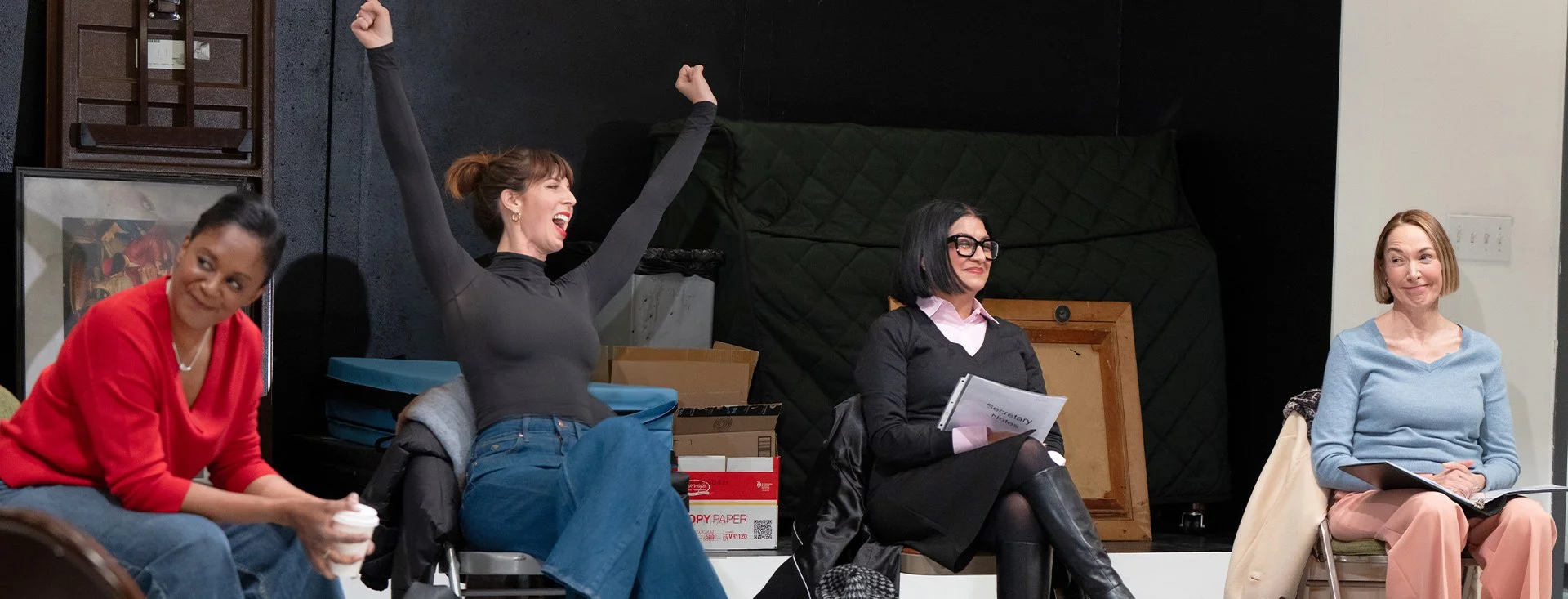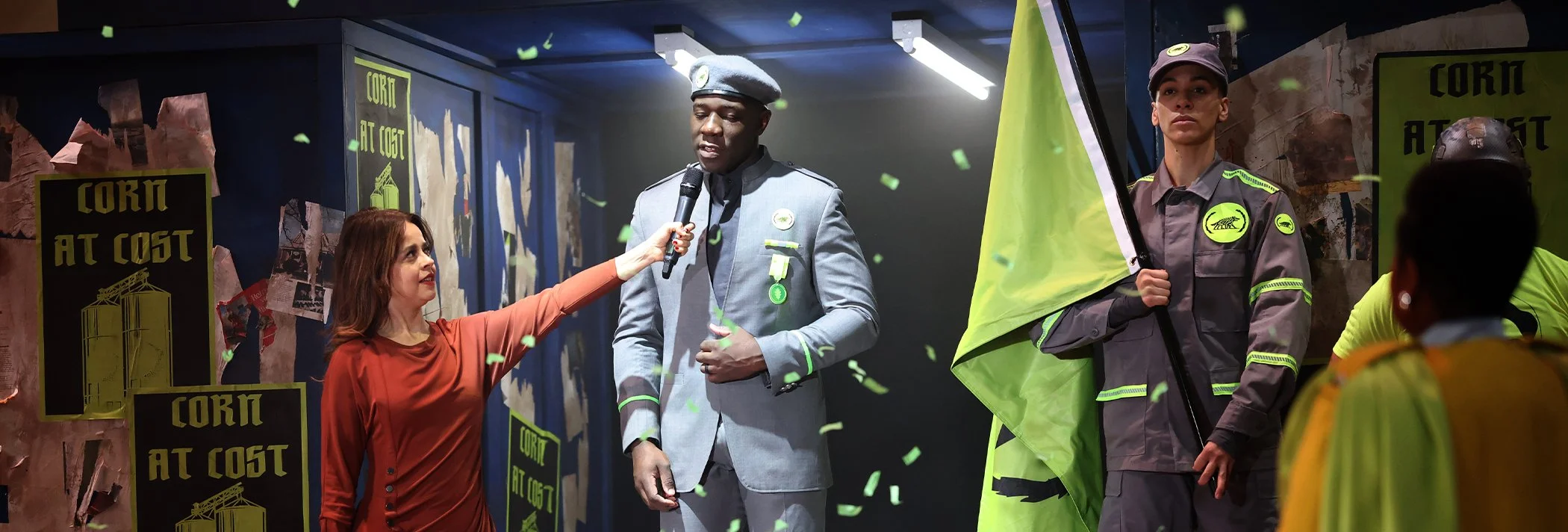Jacob Perkins’s The Dinosaurs is a meditation on sobriety and female friendship. It unfolds within a women’s and trans-inclusive alcohol-recovery group dubbed the Saturday Survivors, a nod to the day of the week they meet over coffee, scones, and doughnuts in a bland, white, windowless community room with folding chairs (scenic design by dots). Under Les Waters’s direction, the 70-minute play, which features a remarkable ensemble of actors, slides from a naturalistic mode into an experimental one, as time and identity are upended. The experiment, however, proves frustratingly vague rather than provocative.
The Monsters
Mixed Martial Arts (MMA) is the ostensible subject of Ngozi Anyanwu’s taut two-hander The Monsters, now running Off-Broadway at Manhattan Theater Club after a fall stint at Two River Theater in New Jersey—but the play’s true combat is emotional. Beyond the excellent choreography and fight direction (by Rickey Tripp and Gerry Rodriguez, respectively), the deeper exhilaration stems from seeing two actors, Aigner Mizzelle as Lil and Okieriete Onaodowan as her big brother Big, deliver beautifully realized performances.
The Burning Cauldron of Fiery Fire
Anne Washburn’s The Burning Cauldron of Fiery Fire, making its world premiere at the Vineyard Theatre, defies categorization. The offbeat exploration of an agrarian California commune bordering on a cult might also defy comprehension; your mileage may vary depending on your tolerance for unknowable mysteries. There is something mesmerizing about Burning Cauldron, beautifully strange and compelling, with silliness and menace existing so comfortably side by side. Who needs easy answers when the questions are this much fun?
Kyoto
Joe Murphy and Joe Robertson’s Kyoto, now playing at Lincoln Center after runs in Stratford-upon-Avon and London, opens by breaking the fourth wall and reminding the audience that “the times you live in are fucking awful.” The statement, delivered by the play’s narrator, Don Pearlman (Stephen Kunken), a right-wing Department of Energy lawyer during the Reagan administration and now a climate change–denying crusader, is preceded by video projections (designed by Akhila Krishnan) of Americans acting violently, including the Jan. 6 terrorists storming the Capitol. For Pearlman, the 1990s, the period on which the play concentrates, “were freakin’ glorious” by comparison.
Endgame
“You’re on earth, there’s no cure for that!” The sentiment, bellowed by Hamm to his servant Clov in the Druid Theatre’s revival of Samuel Beckett’s postapocalyptic Endgame, is freshly relatable to a U.S. audience. Under Garry Hynes’s direction, this Endgame is full of laughs—both she and the ensemble fully grasp the idea expressed by Hamm’s trash-bin-residing mother, Nell, that “nothing is funnier than unhappiness”—but it achieves this tone by leaning into, rather than shying away from, the play’s relentless bleakness.
This Much I Know
Jonathan Spector’s This Much I Know is an erudite, ambitious, and wide-ranging play in the vein of Tom Stoppard. Three actors play dozens of parts, spanning nationalities and time periods; historical events and personages alternate with the everyday problems of people trying to navigate 21st-century life; and questions of cognition, epistemology, and politics are interrogated.
The Weir
The Irish Rep is currently staging its fourth production since 2013 of Conor McPherson’s 1997 play The Weir, with several of the cast reprising roles. And yet there is nothing stale about this staging—instead, the play is brought to exhilarating life by a marvelous ensemble, under Ciarán O’Reilly’s assured direction. The Weir is essentially a collection of four ghost stories, which arise naturally out of the banter in a rural Irish pub, that ultimately reveal more about the loneliness of the people telling them than anything supernatural.
Lunar Eclipse
Lunar Eclipse, Donald Margulies’s 2023 play now receiving a Second Stage Theater production (at Signature Center), opens with one of the two characters, George, sobbing alone. George is a farmer in his 70s, sitting in darkness in a field in western Kentucky, where he is soon joined by his wife, Em, to watch a lunar eclipse. George and Em will not simply observe the overnight event: they will overcome George’s gruff exterior and look back over the course of their life together, facing difficult subjects, including the death of a child, and ultimately reaffirming their connection.
Eurydice
Encountering adaptations of the myth of Orpheus and Eurydice seems as inevitable as Orpheus’s fateful turning around to look toward Eurydice on their journey out of Hades. Sarah Ruhl’s Eurydice, from 2003, is receiving a revival to conclude her Signature Theatre residency. The production is directed by Les Waters, who also helmed the play at Yale in 2006 and at Second Stage in 2007. Ruhl’s mournful and whimsical take emphasizes Eurydice’s life and point of view, hence the title excising “Orpheus and,” even bestowing its heroine with some agency, especially during that oh-so-famous moment of Orpheus looking back.
Irishtown
There have been many memorable productions at the Irish Rep over the years—of Beckett, Synge, Friel, O’Casey, McPherson, and more—but with Ciara Elizabeth Smyth’s Irishtown, it’s clear that the venerable nonprofit theater has a robust and self-deprecating sense of humor, able to laugh about the dominant tropes of Irish drama and the innumerable depictions of trauma and strife. Smyth’s play, developed under the theater’s New Play Development initiative and directed by Nicola Murphy Dubey, who leads that initiative, is a departure from its typical fare: a funny, satirical exploration of Irish theater, stories, and cultural identity.
Sumo
Lisa Sanaye Dring’s Sumo, co-produced by Ma-Yi Theater Company, comes to the Public Theater after an earlier run at La Jolla Playhouse, and specifically addresses an audience whom it assumes knows little about the ancient Japanese art and sport of sumo. And so Drang’s play becomes an opportunity to teach about this sacred ritual, and actually show it to us, while also crafting a story of a rebellious young underdog’s rise to the top against a hostile mentor.
Ghosts
In 1881, Ibsen’s Ghosts was considered shocking for its critique of conventional morality and its unabashed treatment of venereal disease and religious hypocrisy, among other topics. While the specifics of the social issues that the characters grapple with are not pressing today—syphilis is a curable disease, a woman trying to leave an unhappy marriage is not unthinkable, nor is the idea that a person of high social rank might be a degenerate—moral hypocrisy, patriarchy, class resentment, and generational trauma are always ripe for the stage. The gripping, finely acted production of Ghosts now playing at Lincoln Center, directed by Jack O’Brien and adapted by Mark O’Rowe, threads this needle: it retains the historical setting (though with a framing device) and yet makes the moral debates feel like more than artifacts from another era.
Deep Blue Sound
The Clubbed Thumb theater company follows up last year’s excellent Grief Hotel with another gem that originated in its Summerworks program, Abe Koogler’s Deep Blue Sound, in which a group of islanders in the Pacific Northwest mourn the disappearance of a nearby pod of orca whales. The production, in residency at the Public Theater, is astonishing: Koogler’s play is both strange and naturalistic, as funny as it is deeply moving, even shattering; Arin Arbus’s note-perfect direction is mesmerizing, smartly enhancing the emotional climaxes but never overdoing them; and the ensemble of nine is simply extraordinary.
The Antiquities
Stories on stage and screen that engage with, critique, or warn about artificial intelligence (AI) are as much in vogue as AI itself. McNeal, about art and AI, recently concluded its Broadway run; We Are Your Robots and Prometheus Firebringer at Theater for a New Audience addressed collective veneration of the technology Off-Broadway; and Companion, a twisted and funny exploration of human and nonhuman desire, opened this month in movie theaters. Now, Jordan Harrison’s The Antiquities, an episodic look at our current technological moment—or precipice—through the artificial eyes of the future, enters the AI discourse at Playwrights Horizons (co-produced with the Vineyard Theatre and the Goodman Theatre).
Walden
Given recent electoral events it doesn’t require a huge imaginative leap to envisage a dystopian United States in the “not-so-distant future.” That future is when Amy Berryman’s philosophical, sci-fi–infused play Walden, which premiered on London’s West End and now comes to Second Stage Theater, takes place, depicting a world wrecked by climate catastrophe, human folly, and rapaciousness.
What Doesn’t Kill You
“Do you all eat grapes?” James Hindman asks, proffering a bowl of green grapes at the outset of his one-man show, What Doesn’t Kill You, directed by Suzanne Barabas, artistic director of the New Jersey Repertory Company, where this show began its theatrical life. And while Hindman perhaps doesn’t want anyone to leap to their feet and grab a grape, this kind of seemingly non-rhetorical question is part of the audience intimacy he develops throughout the piece (and indeed some audience members did call out at various prompts, though no one took a grape). Hindman’s friendly, casual style establishes rapport, and once everyone is comfortable, he becomes a tour guide on his personal journey into and out of a New Jersey hospital, after suffering the kind of heart attack that one nurse refers to as the “widow maker.”
Deep History
David Finnigan’s performance piece on the climate crisis, Deep History, now playing at the Public Theater after stops elsewhere, including the Edinburgh Fringe, will inevitably be compared to a TED talk: Finnigan is scientifically fluent and uses images from his laptop (video design by Hayley Egan) to craft a deeply informed narrative of climate and human history, with some autobiography and whimsy mixed in. TED talks can be engaging, of course, and Finnigan is certainly that; but this description also sells Finnigan short. There is theatricality at work in the 65-minute piece, directed by Annette Mees, particularly a twist in the storytelling that revolves around the gap between 2019 (when the piece was written) and the time when it is performed.
Women of Will
Tina Packer’s Women of Will is meant to be an educational performance piece that explores Shakespeare’s trajectory as a writer through the lens of his female characters, diving into issues of gender and power. The piece has had various productions over the years and was published as a book in 2015 (subtitled Understanding Shakespeare’s Female Characters). Eric Tucker, the artistic director of Bedlam, who has directed the show before, now directs what he has referred to as Women of Will 2.0, for a limited engagement at the West End Theatre.
Sump’n Like Wings
Playwright Lynn Riggs is best remembered for Green Grow the Lilacs (1931) because it was the basis for Oklahoma! (1943). Now his play Sump’n Like Wings is having its New York debut 99 years after it was written. Such resurrection of a forgotten work is the core mission of the Mint Theater, as are the deep research and care that inform its meticulously crafted productions.
The Counter
Director David Cromer has the ability to conjure expansive worlds from small, banal settings: For Meghan Kennedy’s The Counter, the set (designed with remarkable detail by Walt Spangler) occupies only a part of the space available on the stage of Roundabout’s Laura Pels Theatre. As he did with A Case for the Existence of God at Signature Theatre, Cromer encloses the characters in order to open them up. Of course, in order to perform this low-key magic, there must be sharply drawn, deeply human characters to work with.
























